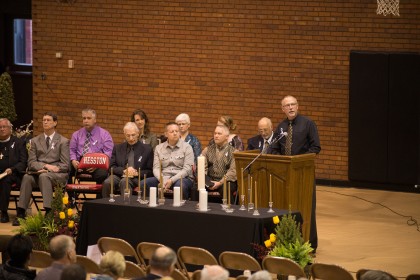When grief is not normal
by Billy Bass – Horizon News Editor
The Hesston College community is one that supports its people. As this community processes Thursday’s tragic events and mourns the loss of friends and colleagues, we try to make sense of violence in our world. It is normal that we should all feel a wide range of emotions. It’s normal that we cope with our grief in different ways.
But if grief is too extreme, or if you have trouble recovering from the events of last week, you may need help.
Campus counselor Julie Lehman provides guidance on how to distinguish between the two:

What is normal in times of grief?
Lehman says its important to realize that everyone’s grief process is different, so don’t expect a formula.
“For those familiar with the stages of grief, we often think we will go through those steps in a linear way: This, then this,” she said. “Everyone’s grief process is different, and we often compare our grief process with others, when we all grieve in our own way.”
We may see a wide variety of expressions of grief in others.
“They may cry or have a blank face, where their emotions are churning inside. For some, it is an anger response.”
What’s most important, Lehman says, is to let yourself experience the pain of grief in a comfortable place.
“Give yourself the space to experience what you’re experiencing.”
Lehman describes how in a tragedy, our brains try to make order. It’s the way they were designed. We can help that process of creating order by doing what we know has been helpful in the past, whether that’s through reading, prayer, conversation or time outside in nature.
What is not normal in times of grief?
While withdrawing is okay, Lehman says there’s a limit.
“If you notice within yourself, or within others that, in time, that you cannot engage with your day-to-day activities, eat, get out of bed, take a shower… if you’ve become completely disengaged from your surroundings, it’s time to reach out to someone.”
It’s also important to be observant of your peers. If an individual is violent, outraged, or wishes to respond by seeking revenge in some way, speak to someone immediately. These extreme comments are worth noting, and need to be handled promptly.
All in all, be mindful of your fellow Larks, and lift up and support each other in God’s grace.
“Holy Spirit, come with power, breathe into our aching night. We expect you this glad hour, waiting for your strength and light. We are fearful, we are ailing, we are weak and selfish too. Break upon your congregation, give us vigor, life anew.”
Hymnal A Worship Book, 26 (Neufeld Ropp)
______________________________________________________________________________
Campus Contact Persons
If you need support in this time of grieving, consider these resources.



